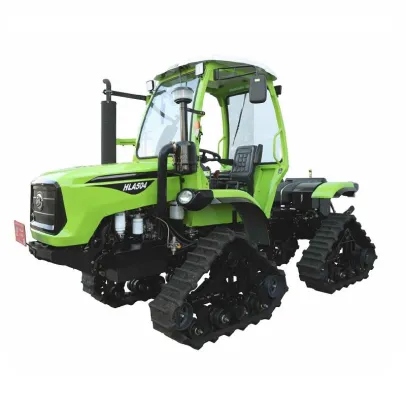Things to note when buying agricultural tractors
Agricultural tractors include three types: walk-behind tractors, wheeled tractors, and crawler tractors; they can be divided into large, medium, and small tractors according to power.
Among them, walk-behind tractors are small tractors with a power of less than 11kW (15 horsepower), which are mainly suitable for farmland operations and short-distance transportation operations on small plots of land, and are commonly used in rural areas in the south. Wheeled tractors are divided into two types: belt-driven and power output shaft-driven. Belt-driven tractors are generally small four-wheel tractors with a power of 8.8kW to 14.7kW (12 horsepower to 20 horsepower); power output shaft-driven tractors are large and medium-sized tractors with a power of more than 14.7kW (20 horsepower). With the needs of production, the power of tractors is getting bigger and bigger; wheeled tractors are mainly used for farmland operations or transportation operations in rural areas in northern my country. Among them, large wheeled tractors are suitable for use in large-scale farmland production, which can greatly improve production efficiency. Crawler tractors can be equipped with bulldozers, so they are generally used more in farmland capital construction and water conservancy projects. Agricultural tractors are all powered by diesel engines.
The following mainly introduces the most commonly used small four-wheel tractors.
1. Selection of the whole machine form
Small tractors with belt drive are usually called small four-wheel tractors. In recent years, there are mainly two types of small four-wheel tractors on the market: 11.0kW (15 horsepower) and 13.2kW (18 horsepower). There are fewer small four-wheel tractors with 14.7kW (20 horsepower) and 8.8kW (12 horsepower) on the market. There are two major types of diesel engines installed on small four-wheel tractors, one is an evaporative water-cooled diesel engine, and the other is a circulating water-cooled diesel engine. Since the structures of these two types of diesel engines are different and the parts cannot be interchanged, when purchasing a tractor, you should choose the type of diesel engine commonly used in your area, which is very important for future repairs and maintenance.

2. Product selection
Since the product is recognized by the public in long-term use, or approved by authoritative departments (such as products with agricultural machinery promotion licenses from the Ministry of Agriculture), its product quality is reliable, performance is advanced, product coverage is large, and after-sales service is good.
3. Check the appearance
① The paint of the shell should be bright and uniform, without peeling or shedding, and the feel should be smooth and flat.
② The surface of the casting should be flat, without cracks or sand holes visible to the naked eye. The appearance of the sheet metal should be smooth, and the surface of the electroplated parts should be bright and free of rust.
③ The surface of the tire should be smooth, with regular patterns and no bubbles or cracks.
4. Check whether the protective devices and warning signs are complete
① Check the starting shaft head of the engine. The end of the shaft head cannot protrude from the outer plane of the engine case. To prevent danger when people approach during the operation of the engine.
② The pulley and belt must have a protective cover. To prevent danger when people approach during the operation of the engine.
③ There should be a protective cover on the exhaust pipe. To prevent the operator from accidentally touching it.
④ The steps and pedals for getting on the car should have anti-slip mesh and raised edges or ribs. To prevent the driver from slipping when getting on and off the car, causing falls and injuries.
Additional resources:Need Pointers For Driving Dump Truck - Page 1
Flatbed Trailer Buying Guide - Product Information - News
⑤ The shaft head of the power output shaft must have a protective cover. To prevent danger when people approach during the operation of the engine.
⑥ On the operating device where the operating direction is not obvious, there should be a symbol indicating the direction. To prevent misoperation.
5. Check the operating mechanism
① The throttle and the lever are connected reliably, and there is no jamming when testing.
② Push and pull the main and auxiliary gear levers (shift levers) according to the operating procedures to confirm their reliability.
③ When the steering wheel is not moving at the front wheel, its free rotation angle should not be too large, and should be less than 30 degrees.
6. Test run
① Check the engine oil level, add diesel and cooling water.
② When the ambient temperature is above 5℃, start three times in a row, of which two should start smoothly within 30 seconds.
③ Run for 10 minutes at medium throttle, and observe that the exhaust and engine sound should be continuous and stable.
④ After 10 minutes, reduce the throttle as much as possible, run at low speed (idle), and the engine sound should be stable.
⑤ Gradually increase the throttle, the engine sound should also be stable, and the exhaust pipe should not emit black smoke when the throttle is on.
7. Stop the car for water and oil leakage inspection
Observe that there should be no dripping and flow marks on the joint surfaces of each rotating part. The static joint surface should not be wet when touched by hand.
More information about agricultural tractors

Comments
0